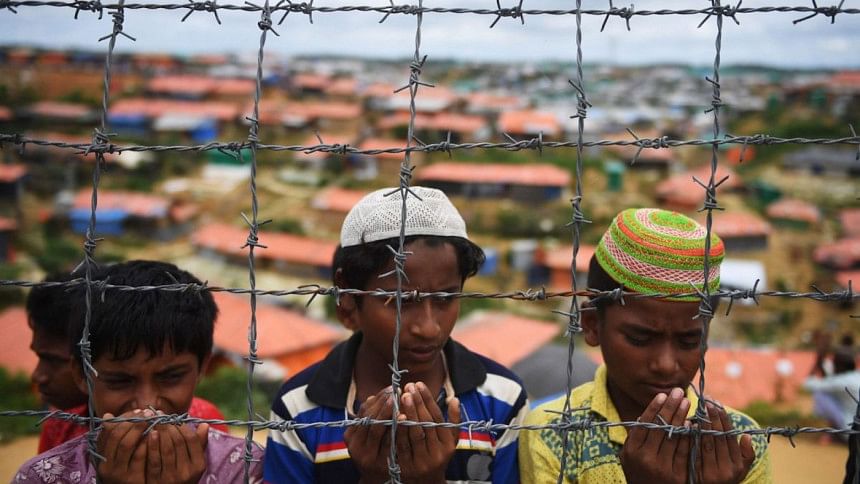Rohingya: The people with no land

They were once the residents of Rakhine state. Then they became victims of persecution. Then they turned into refugees, desperately crossing the Naf river to seek refuge in Bangladesh. And now they have become a burden, who everyone sympathises with but no one bothers to support with meaningful action in their quest for a return to their homeland, except of course Bangladesh—the nation currently hosting them—and a handful of other nations such as The Gambia.
The protracted stalemate over the Rohingya refugees continues with Myanmar doing absolutely nothing to create a conducive environment for their return. On the contrary, over the last few years, Myanmar has bulldozed Rohingya villages in Rakhine state and established new installations and infrastructure. A recent report by Al Jazeera stated that the UN has said that Myanmar has erased the name of Kan Kya—once a Rohingya village—from its official maps.
According to the same Al Jazeera report, "Where Kan Kya once stood, there are now dozens of government and military buildings including a sprawling, fenced-off police base, according to satellite images publicly available on Google Earth and historical images provided to Reuters by Planet Labs… On maps produced in 2020 by the United Nations mapping unit in Myanmar, which it says are based on Myanmar government maps, the site of the destroyed village is now nameless and reclassified as part of nearby town Maungdaw."
Kan Kya is just one of the more than dozen villages whose names have been changed or erased in Myanmar. And since 2017, more than 400 villages once inhabited by the Rohingya have been razed to the ground. The Rohingya refugees fear that this is a tactic by the Myanmar government to completely remove the possibility of the Rohingya refugees ever returning to Myanmar. If they have no roots, where will they return?
And this reclassification of villages is also going to make it legally difficult for the Rohingya refugees to go back to their land. Stephane Dujarric, spokesperson for the UN Secretary-General, suggested that the change in the legal status of the villages would add "an additional layer of complexity" for the refugees.
But Myanmar seems to have lost all sense of justice. Despite all the proven allegations against the nation of unleashing horrific brutality on the helpless Rohingya population, and the country's visible lack of interest in taking the Rohingya back, its Minister of the State Counselor's Office, Kyaw Tint Swe, shamelessly went on to allege at the UN General Assembly recently that Bangladesh has been harbouring the Arakan Rohingya Salvation Army (ARSA) and the Arakan Army (AA) in Cox's Bazar.
To quote the speech text, "Efforts to prevent ARSA and its supporters in the camps of Cox's Bazar from hampering the bilateral repatriation process, through threats, violence or other illegal conduct, also need to be strengthened as such activities pose a risk to both Bangladesh and Myanmar."
As expected, Bangladesh rubbished the "unsubstantiated claims and undue accusations" by Myanmar, and called upon the country to open up Rakhine to international bodies such as the UN for observation, if it really intended to take its people back.
But given the lethargic attitude of Myanmar to address the issue of Rohingya repatriation—"We write to them [Myanmar government] regularly to resume the talks. Sometimes they reply, sometimes they don't. It's becoming difficult to bring them to the discussion table", revealed Delwar Hossain, director general of the Myanmar wing at Bangladesh's Ministry of Foreign Affairs, to Arab News—and the lack of proactive efforts by the international community to push Myanmar to stop its genocidal activities and take back its people, the future looks bleak for the Rohingya.
The inertia of the international community to intervene in this matter comes as no surprise, given that most of them have heavily invested in trade and development ties with Myanmar. According to a Bangkok Post report released October last year, "A total of 106 enterprises from 18 countries and four local businesses have ploughed in USD 1.84 billion" in Special Economic Zones in Myanmar.
The list of countries include the United Kingdom, the United Arab Emirates, Malaysia, France, Switzerland, Australia, South Korea, Hong Kong, Taiwan, Panama, China, Brunei, Vietnam, Austria and the Netherlands, with Japan topping them all. And of course, there are extensive Indian and Chinese—the two major regional players—investments in Myanmar. One of these Special Economic Zones is in the Rakhine state itself: Kyauk Phyu.
So here we are, sheltering 1.1 million people for three years, even in the face of dwindling foreign aid, with no sign of their repatriation in sight—at least not anytime soon. Experts suggest political solutions to the problem of the Rohingya refugees, but without strong political will from the Myanmar government, how can we find such solutions to this problem? And with elections in Myanmar coming up next month, it is highly unlikely that the ruling party would want to disturb the equilibrium it has reached with the Myanmar army by going against popular sentiments, which unfortunately are highly anti-Rohingya. Even if the National League for Democracy is re-elected, chances are they would continue to cater to the priorities of their patrons and their people.
The Rohingya refugees—stuck in the crosscurrents of geopolitical and economic manoeuvres—it seems, are here for the long haul. The stalemate is unlikely to be resolved anytime soon. Bangladesh has been pretty much left on its own to fight this battle for the cause of the persecuted Rohingya. At least, that is how the state of affairs look right now, and will continue to remain so for the foreseeable future. The fate of the Rohingya remains as uncertain as ever.
Tasneem Tayeb is a columnist for The Daily Star. Her Twitter handle is: @TayebTasneem

 For all latest news, follow The Daily Star's Google News channel.
For all latest news, follow The Daily Star's Google News channel. 



Comments